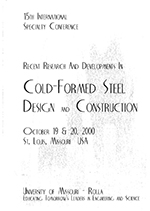Session Dates
19 Oct 2000
Abstract
The applications of cold formed steel in residential construction have been increasing rapidly in recent years around the world. Some framing practices have been developed that are not covered by the current design specifications, such as using thin cold formed steel stud sections as web stiffeners for C-section floor joists. Earlier tests have shown that the current design methods are unconservative when applied to the types of stiffeners in common usage today. There are a number of variables that influence the capacity of these stiffeners such as stiffener type, position on the joist and connections. All parameters need to be considered if a reliable design procedure is to be formulated. Described in this paper is an experimental investigation of what effects the stiffener end gap, fastener configurations and bearing width have on the ultimate capacity of a stiffened cold formed steel C-section joist subject to two-flange loading.
Department(s)
Civil, Architectural and Environmental Engineering
Research Center/Lab(s)
Wei-Wen Yu Center for Cold-Formed Steel Structures
Meeting Name
15th International Specialty Conference on Cold-Formed Steel Structures
Publisher
University of Missouri--Rolla
Document Version
Final Version
Rights
© 2000 University of Missouri--Rolla, All rights reserved.
Document Type
Article - Conference proceedings
File Type
text
Language
English
Recommended Citation
Schuster, R. M. and Fox, S. R., "Strength of Bearing Stiffeners in Cold Formed C-sections" (2000). CCFSS Proceedings of International Specialty Conference on Cold-Formed Steel Structures (1971 - 2018). 5.
https://scholarsmine.mst.edu/isccss/15iccfss/15iccfss-session3/5
Strength of Bearing Stiffeners in Cold Formed C-sections
The applications of cold formed steel in residential construction have been increasing rapidly in recent years around the world. Some framing practices have been developed that are not covered by the current design specifications, such as using thin cold formed steel stud sections as web stiffeners for C-section floor joists. Earlier tests have shown that the current design methods are unconservative when applied to the types of stiffeners in common usage today. There are a number of variables that influence the capacity of these stiffeners such as stiffener type, position on the joist and connections. All parameters need to be considered if a reliable design procedure is to be formulated. Described in this paper is an experimental investigation of what effects the stiffener end gap, fastener configurations and bearing width have on the ultimate capacity of a stiffened cold formed steel C-section joist subject to two-flange loading.



